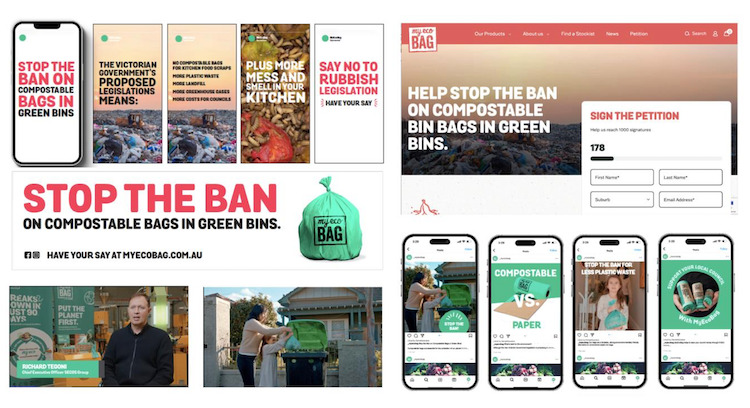SECOS strongly opposes proposed ban on compostable bin liners in Victoria

SECOS fights potential compostable bin liner ban in VIC. Image: Getty
- SECOS has voiced opposition to the draft Victorian Household Waste and Recycling Service Standard 2024
- This proposal classifies certified compostable caddy bin liners as ‘non-acceptable materials’
- SECOS cites far-reaching environmental and financial issues it finds problematic with the proposal
Special Report: SECOS opposes the draft Victorian Household Waste and Recycling Service Standard 2024, which excludes certified compostable caddy bin liners despite their widespread use by over 80% of Australian FOGO councils.
Secos Group (ASX:SES) has provided an update on the draft Victorian Household Waste and Recycling Service Standard 2024, which has sparked concern following its proposal in June.
This draft standard, developed under the Circular Economy (Waste Reduction and Recycling) Act 2021, has classified certified compostable caddy bin liners (including caddy liners certified to AS 4736 and AS 5810) as non-accepted materials within Victoria’s proposed new household waste and recycling system.
It’s important to note, however, that this draft standard has not yet been formally endorsed or legally enforced.
SECOS says it strongly opposes this classification, asserting that it contradicts broader environmental goals in Australia and directly conflicts with the draft standard’s objective to reduce landfill waste.
SECOS is now actively liaising with the Minister for Environment, governmental departments, Victorian parliamentarians, and local councils to highlight the negative impacts of the proposed ban on consumers, ratepayers, and the environment.
Meetings with the Minister for Environment’s office have already resulted in requests for clarification on certain claims made in the regulatory documents.
SECOS is also lobbying members of parliament across party lines and communicating with over 180 local councillors to garner support against the proposed ban.
In addition to these advocacy efforts, SECOS has launched a public awareness campaign, including billboards, shopping centre displays, and targeted social media ads.
The company is actively encouraging public participation through a petition on myecobag.com.au, leveraging platforms like Facebook, Instagram, Google, and YouTube.
SECOS is also leveraging public relations and collaborating with social media influencers to amplify the message.
Through these coordinated efforts, SECOS says it aims to block the proposed ban on certified compostable plastic caddy liners, advocating for sustainable waste management practices that align with environmental objectives.

Issues with paper caddy liners
SECOS’ findings indicate that despite widespread adoption of certified compostable caddy bags by over 80% of Australian FOGO (Food Organics and Garden Organics) councils, a minority of commercial composters have influenced the government’s decision to exclude these liners.
These composters argue that compostable caddy liners contaminate FOGO waste streams, a claim vehemently contested by SECOS, which asserts that compostable bags actually play a crucial role in reducing contamination rates.
Addressing the claims made in the draft standard and Regulatory Impact Statement (RIS), SECOS points out several critical issues with alternatives such as the paper caddy liners proposed as substitutes:
- Hygiene: Paper liners degrade quickly when exposed to moisture from food waste, fail to contain odours, and do not prevent pests, posing hygiene risks.
- Cost: Paper liners are significantly more expensive than compostable alternatives, placing financial strain on councils.
- Environmental impact: Paper liners contribute to deforestation and use non-renewable resources, unlike compostable bags made from corn, which have a lower environmental footprint.
Far-reaching problems with using alternatives
SECOS further emphasised that households using certified compostable caddy bin liners divert up to 30% more food waste compared to those restricted from using them, contradicting claims of increased contamination.
SECOS has also challenged financial savings projections outlined in the RIS, arguing they are inflated and based on data skewed by councils already utilising compostable liners.
The implications of banning certified compostable caddy liners are far-reaching, according to SECOS, and these include:
- Increased landfilling of organic waste leading to higher greenhouse gas emissions.
- Higher landfill costs for councils and taxpayers.
- Potential increase in conventional plastic usage and CO2 emissions.
- Stifled innovation in compostable technology within Australia.
- Unfair advantage to traditional plastic manufacturers over environmentally friendly alternatives.
- Victoria becoming the only state and possibly the sole jurisdiction globally to enforce such a ban.
With the consultation period closing on August 14, SECOS is urging stakeholders to voice their objections through official channels and participate in the government survey.
The company is actively mobilising support via a petition and encouraging shareholders to engage with local representatives to prevent the implementation of these standards.
SECOS says it remains committed to advocating for sustainable waste-management practices that support environmental goals while challenging regulatory measures that could hinder progress in this area.
The company will continue to engage with the Victorian Government and will submit formal objections as part of the ongoing consultation process.
This article was developed in collaboration with SECOS Group, a Stockhead advertiser at the time of publishing.
This article does not constitute financial product advice. You should consider obtaining independent advice before making any financial decisions.
Related Topics
UNLOCK INSIGHTS
Discover the untold stories of emerging ASX stocks.
Daily news and expert analysis, it's free to subscribe.
By proceeding, you confirm you understand that we handle personal information in accordance with our Privacy Policy.








